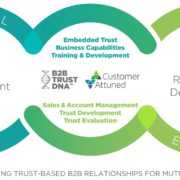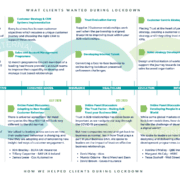Writing business – It’s all about attitude
At Customer Attuned, one of our sectors of expertise is the insurance industry. Being a ‘non-player’ in the process of underwriting business for customers, we have been the beneficiaries of some real honesty from our various contacts at brokers and insurers alike: about their challenges; what their counterparts at the broker/carrier office do well and not so well; and what they get extremely frustrated by! This article looks at one such challenge.
In conversations with insurers, we are often asked, “How do I get more business from my broker network?”
We have taken the opportunity to go out and ask a number of brokers exactly this question, and we now share some of their responses.
During a recent conversation with a highly experienced commercial manager and team leader at a regional broker, the answer to the question is quite obvious to him.
He shared his frustration with underwriters that ‘hid’ behind the risk profiling as a reason not to write the business. “How come all the other carriers seem able to write this business, yet one can’t. That isn’t about risk appetite it’s down to the mind-set of the underwriter.”
He went on to explain that two underwriters at the same carrier operated in entirely different ways, one gained a large share of their book; the other was rarely asked to quote. “Why?” I asked.
His summary was:
“Underwriter one; demonstrates a proactive approach to writing the business. They go out of their way to bend and flex within the parameters set down by the carrier. They will discuss with us how they can write it and what we need to do to help. Nine times out of ten we make it happen – now and again it isn’t to be – but we accept this is the business we are in.”
The commercial manager at the broker liked the fact that the underwriter understood their business and what they bring to the party. They respected their role and he also liked being taken seriously, “I have been in this business for 20+ years and if I ask for a quote or position on a case then it’s worth doing, as I don’t ask carriers to quote for commodity, low value or time wasting.”
Turning now to underwriter two. “We know him really well, he’s a nice guy, but he often demonstrates a ‘computer says no’ mentality. He seems to go out of his way not to write the business or find a reason to avoid it if there is any degree of ‘non-vanilla’. “We don’t have the appetite for this level of risk,” is what normally comes back. I find that odd, as all the other carriers seem to! I have put him down the list as a last resort, or will throw the odd case his way after the BDM has been in. However, unless he changes his mind-set and gets pro-active we will drop him.”
Does the above sound familiar? Unfortunately, we have heard this a lot. It seems to stem from underwriters needing to display a mind-set shift, becoming more pro-active and actively engaged with the broker(s). Finding ways to say yes, rather than no. But from conversations we have had with insurers, all the blame can’t be laid at the feet of the underwriter. Too often it can stem from them not being supported and empowered in their role by the carrier themselves. Or it can be a lack of clarity in the respective roles of the underwriter and the salesperson in the deal making process. While we are aware that a number of carriers are trying to encourage underwriters to become more pro-active and trading orientated, a full alignment of the process is often missing. For example, the measurement system encourages the reverse where they are measured purely on bottom line performance. This will encourage a safety first attitude. We are not proposing a complete opposite, as a measurement based on purely top line will encourage the wrong behaviour too! But a healthy balance is required if carriers want to grow profitably.
As a second example, we have heard many times from brokers how often they deal with underwriters who – lack commercial awareness; don’t seem to be able to understand their position; are unable to communicate with them with any degree of confidence; and so on. If carriers want their underwriters to work with sales to help trade and secure business, not only does the process need to be aligned with this goal, underwriters need to have the skills and/or the opportunities to develop the required skills to enable them to do so.
So in summary, what are some of the things you can you do to help brokers like our commercial manager, deal more effectively with you?
- Develop a pro-active mind-set in your underwriting community; “its ok to write business”
- Demonstrate a can do positive attitude to the brokers you want to work with
- Recognise that the brokers have a lot of experience and their judgement has value.
- Encourage your underwriters to PRO-ACTIVELY write business
- Monitor the cases they turn down
- Keep a log of who is saying no and why
- Reward those underwriters writing profitable business
- Get them out of the office and meeting the key stakeholders in your key brokers
- Train them in the basics of customer management, from relationship building to trading skills
- Get them working with their Broker Development Managers / Sales colleagues as collaborative broker teams
If you are interested in exploring any of the topics raised in the article or you have any views of your own you would like to share, please get in touch – we would love to hear from you.
- The importance of leaders supporting the development of sales and account management teams - July 24, 2024
- Top 4 behaviours of successful Account Managers that sets them apart. - June 19, 2024
- What value do you see as a leader when you invest in your sales and account management teams? - May 8, 2024




